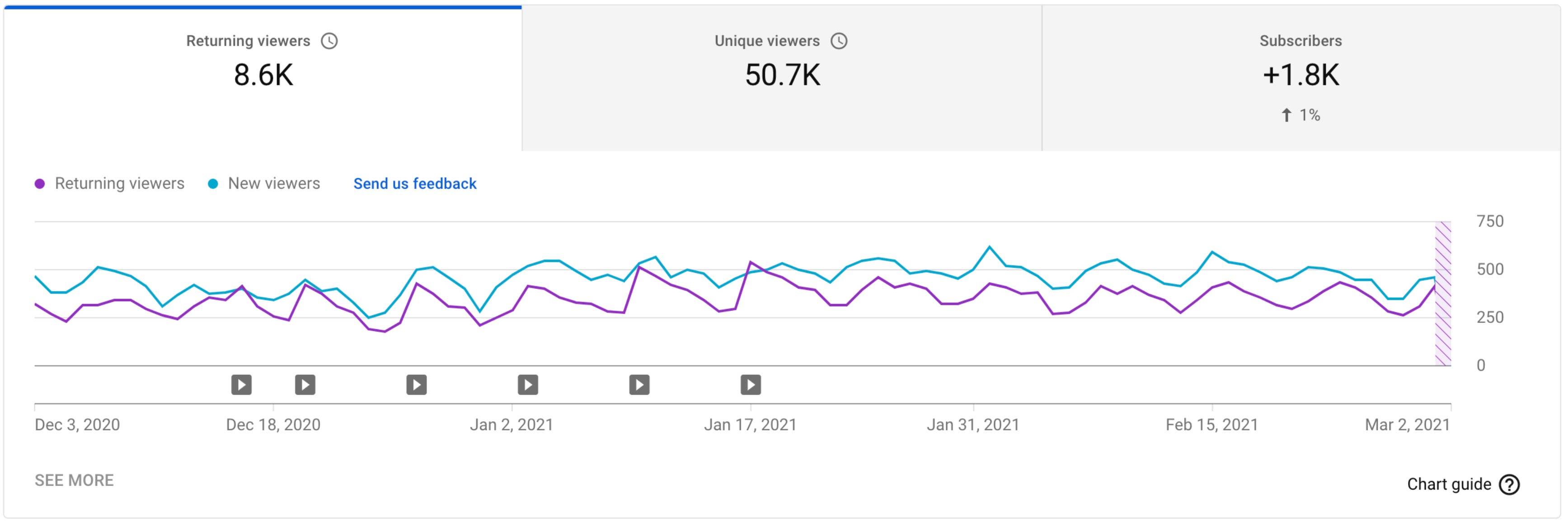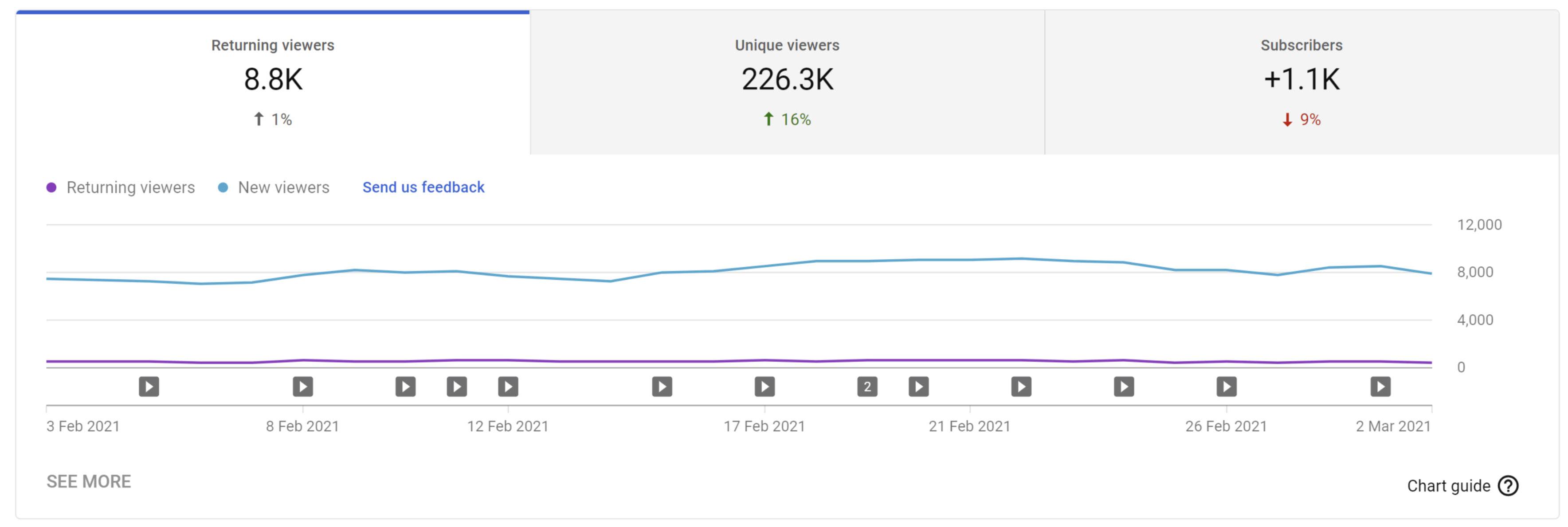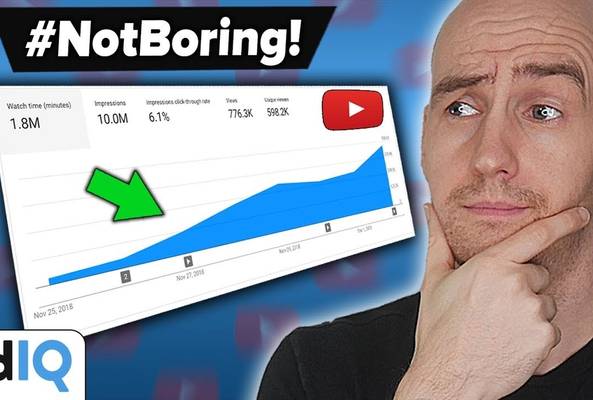Lydia Sweatt is a writer who loves balancing her article/blog time indoors with a healthy dose of nature. She bikes, hikes, and identifies edible plants along the way.
YouTube Cheat Code Unlocked: How to Track Returning Viewers on Your Channel

Of all the new viewers on your YouTube channel, how many return to watch more videos? If a large number of people keep coming back, that’s a good sign. On the flip side, having thousands of unengaged subscribers means you have some work to do.
This year, YouTube is helping creators bridge the gap. The platform has released a new feature that tracks both new and returning viewers to a channel. With these metrics, you can gauge long-term growth instead of temporary wins, such as going viral.
Here’s what it looks like in the YouTube Studio:

There are two new lines (metrics) on this graph. The blue one represents new viewers and the purple one shows how many viewers returned to your channel. When the purple line grows upward, so does your overall audience.
If the YouTube algorithm were something to beat, this would be a major cheat code. Keep reading to learn why returning visitors are worth more than subscribers and how you can leverage this new data.
How to See the Number of Returning Viewers to Your YouTube Channel
- Go to the YouTube Studio.
- Click Analytics in the left navigation menu.
- On the channel analytics page that shows views, Watch Time, subscribers, and estimated revenue, click the Audience tab.
Next, you’ll see an audience graph tracking unique visitors and subscribers. But by default, you should land on a new section that shows new and returning viewers.
Need help finding this graph? Watch our video tutorial below:
How to Analyze Returning Viewer Data on YouTube
Getting more subscribers is great, but attracting viewers who keep returning is impactful. When you gain a subscriber, that means someone liked your content enough to digitally “bookmark” it. The best scenario is when that subscriber returns to watch more videos.
We can see the difference between both behaviors on the vidIQ channel. Here is our audience data for new and returning viewers within the past three months:

In the beginning, we attracted 15,519 returning viewers daily. By the end of this time period, our returning viewer count increased to 24,217.
As more viewers returned to watch our content, other metrics improved. Daily channel views increased from 58,604 to 89,593 views. And now YouTube’s algorithm is finding more viewers to watch our content. We can tell by looking at our daily impressions, which nearly doubled in that same period.
Our new and returning viewer data hasn’t always been positive, though. We posted a few videos about MrBeast – a creator who gets millions of views with each upload – and actually lost returning viewers. He’s a popular creator, so we did gain some new viewers. But overall, we attracted an audience outside our niche. Our core audience subscribed to learn YouTube growth tips.
Take a look at the graph below. It shows a spike in new viewers and a decrease in returning viewers to the vidIQ channel:

This shows a lack of focused content during our MrBeast experiment. We strayed from YouTube education so viewers didn’t watch as many videos.
On the flip side, here’s what the data looks like when we stick to our niche:

As you can see, new and returning viewers increased in this period. Below the graph, we can see which videos were published during this time:
- "We Screwed Up..."
- "How to Get More Views and Subscribers on YouTube"
These videos are about YouTube channel growth. Each one sticks to our niche and creates the right conditions for a large, growing audience.
3 Examples of YouTube Viewer Graphs and What They Mean
As soon as we discovered YouTube’s new and returning viewer data, we asked the vidIQ community to share their analytics with us. This data comes from creators like you, so it’ll be helpful to learn from their successes and mistakes.
Here are three graph examples to diagnose why viewers are returning to or abandoning your channel.
Graph 1: A Dip In Consistency

From the data, it looks like this creator knew their audience well. Each video attracted returning viewers in the beginning. Unfortunately, a lack of consistency killed their momentum, which is proven by the disappearance of black play buttons underneath the graph. Those represent published videos. Return viewer growth began to flatten in January, but the solution is simple: Start creating again.
Graph 2: Popular Videos But Few Subscribers

This graph is a tale of two extremes. YouTube brought lots of new viewers to this channel every day, which is awesome. However, almost none of them come back.
Why does this happen? Most likely, one or a few videos drove traffic to the channel and caused their content to rank higher in YouTube search. But after watching those videos, perhaps viewers didn’t think the channel had anything else to offer them – hence, fewer people subscribing.
Graph 3: “Beating” the YouTube Algorithm

This channel seems to have endless growth. In this case, YouTube is finding new viewers that return to watch more content, which helps the channel grow.
This analytics graph belongs to Jake Fellman, who creates custom, 3D-animated Among Us content. He has 3.5 billion subscribers and more than 2 billion views.
Jake’s channel has more returning viewers than new viewers, which means he’s basically beaten the algorithm – or reached peak content optimization. If you can get the purple line (returning viewers) above the blue line (new viewers), you’ve converted many new viewers into returning viewers.
4 Ways to Make Viewers Return to Your YouTube Channel
Attracting more return viewers leads to YouTube growth. Fortunately, convincing them to come back doesn’t require a complicated, exhausting strategy. You can follow the same core principles of growing a YouTube channel.
All you need to do is...
- Know your target audience and what they watch on YouTube. Brainstorm video ideas they may enjoy watching.
- Make simple, eye-catching thumbnails to increase clicks. You have a fraction of a second to convince viewers a video is worth watching, so make it count.
- Create valuable content. A valuable or entertaining video has high audience retention and/or Watch Time.
- Keep your channel focused. Don’t get sidetracked by unrelated topics; create the content your viewers subscribed to see.
There’s no beating the YouTube algorithm. All you can do is work with it to help your content reach more people. The first step is viewing, studying, and acting on insights from your channel analytics.



